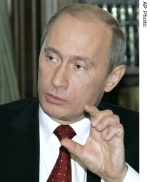-
(单词翻译:双击或拖选)
By Ivana Kuhar
Washington
27 August 2007
Russia's recent resumption of strategic bomber1 flights is viewed by many analysts3 as more evidence of President Vladimir Putin's determination to build up his country's military might. The Russian leader has cited security concerns for strengthening the military, but the move also is reviving memories of the Cold War, when Moscow used its military capability5 to project its power. For producer Ivana Kuhar, VOA's Bill Rodgers narrates6.
Grand entrances are perhaps symbolic7 of President Putin's growing stature8 in the world -- a stature he is trying to enhance by strengthening Russia's military might.
 |
| Vladimir Putin |
Earlier this month, he announced the resumption of strategic bomber flights around the world -- reviving a Cold War practice by the former Soviet11 Union.
Mr. Putin says security threats are forcing Russia to strengthen its military.
But these moves puzzle analysts, such as Russian expert Stephen Sestanovich. "Take the restoration of strategic bomber patrols at long distances from Russian territory. I think the Russians would find it rather hard to tell you what the purpose of that was. Why are they circling around Guam -- an American island in the middle of the Pacific Ocean? What's the connection between that and the Russian national interest?"
Yet many Russians support Mr. Putin's projection12 of strength -- and power. They believe Russia's international stature has grown, according to Russian TV news anchor Alexei Pushkov. "Putin created an impression that Russia can get even with the world leaders after a long period of weakness. Russians do like a strong leader."
While few expect a revival13 of Cold War-type military interventions14, it is unclear what foreign policy goals Moscow is trying to achieve with its tough posturing15.
"They want very much to show a kind of assertive16 independence, but I don't think they've clearly identified for themselves the goals of that assertive independence," said Sestanovich.
Russia's military muscle was on display at the recent airshow outside Moscow -- a showcase for military modernization17. Rebuilding an aging military would seem to be a logical step now given Russia's oil wealth, according to foreign policy analyst2 Richard Weitz. "Some of this is to be expected. The Russians have always had a series of nuclear forces to deter4 the United States and for other purposes. Their naval18 component19 was a weaker component and so it makes sense for them to try and build it up."
The White House has downplayed the buildup, saying through a spokesman it is not surprising that militaries around the world engage in a variety of activities.
But others believe the Kremlin's buildup needs to be watched very carefully.
Sestanovich adds, "Sometimes, countries give themselves a new foreign policy rhetoric20 and they give themselves new foreign policy instruments, and then they take it from there. Sometimes, this can be an unfortunate and dangerous process."
But for now, Russia's military buildup is likely to continue.
 收听单词发音
收听单词发音
1
bomber

|
|
| n.轰炸机,投弹手,投掷炸弹者 | |
参考例句: |
|
|
|
2
analyst

|
|
| n.分析家,化验员;心理分析学家 | |
参考例句: |
|
|
|
3
analysts

|
|
| 分析家,化验员( analyst的名词复数 ) | |
参考例句: |
|
|
|
4
deter

|
|
| vt.阻止,使不敢,吓住 | |
参考例句: |
|
|
|
5
capability

|
|
| n.能力;才能;(pl)可发展的能力或特性等 | |
参考例句: |
|
|
|
6
narrates

|
|
| v.故事( narrate的第三人称单数 ) | |
参考例句: |
|
|
|
7
symbolic

|
|
| adj.象征性的,符号的,象征主义的 | |
参考例句: |
|
|
|
8
stature

|
|
| n.(高度)水平,(高度)境界,身高,身材 | |
参考例句: |
|
|
|
9
modernize

|
|
| vt.使现代化,使适应现代的需要 | |
参考例句: |
|
|
|
10
arsenal

|
|
| n.兵工厂,军械库 | |
参考例句: |
|
|
|
11
Soviet

|
|
| adj.苏联的,苏维埃的;n.苏维埃 | |
参考例句: |
|
|
|
12
projection

|
|
| n.发射,计划,突出部分 | |
参考例句: |
|
|
|
13
revival

|
|
| n.复兴,复苏,(精力、活力等的)重振 | |
参考例句: |
|
|
|
14
interventions

|
|
| n.介入,干涉,干预( intervention的名词复数 ) | |
参考例句: |
|
|
|
15
posturing

|
|
| 做出某种姿势( posture的现在分词 ) | |
参考例句: |
|
|
|
16
assertive

|
|
| adj.果断的,自信的,有冲劲的 | |
参考例句: |
|
|
|
17
modernization

|
|
| n.现代化,现代化的事物 | |
参考例句: |
|
|
|
18
naval

|
|
| adj.海军的,军舰的,船的 | |
参考例句: |
|
|
|
19
component

|
|
| n.组成部分,成分,元件;adj.组成的,合成的 | |
参考例句: |
|
|
|
20
rhetoric

|
|
| n.修辞学,浮夸之言语 | |
参考例句: |
|
|
|















